Therapeutics London 2019
When: -
Time:
Where: Holiday Inn Bloomsbury, Coram St, Bloomsbury, London WC1N 1HT
Interactive CPD points: 16
Therapeutics London focuses on the specialist area of therapeutics, covering all competencies required for IP-qualified optometrists alongside specialist peer discussion. It will appeal to practitioners who are part way through their therapeutics qualification, are considering the IP route, or simply want to make better use of the existing core competencies.
Delegates will experience
- Engaging content from high-profile speakers
- Hands-on skills workshops
- CET across a range of therapeutics competencies including specialist peer discussion
- Therapeutic management of a variety of ocular diseases
- An opportunity to network with like-minded optometrists
For more information, please email [email protected].
8.45AM - 9.15AM
-
Registration
Registration
9.15AM - 9.30AM
-
Welcome
Opening/Closing Session
9.30AM - 10.30AM
-
1 point
The future in focus: nanotechnology, stem cells and gene therapy in eye care
Lecture | Chris Wroten
10.30AM - 11.30AM
-
3 points
Corneal foreign body removal (fully booked)
Workshop | Declan Hovenden
-
1 point
Assessment and management of uveitis
Lecture | Fahd Quhill
11.30AM - 12.00PM
-
Exhibition, tea and coffee break
Session Breaks
12.00PM - 1.00PM
-
3 points
Corneal foreign body removal (fully booked)
Workshop | Declan Hovenden
-
1 point
The power of quantitative imaging in uveitis and beyond
Lecture | Xiaoxuan Liu
-
3 points
Peer discussion: Using DEWS II to classify dry eye subtype and its severity
Workshop | Jonathon Bench
1.00PM - 2.00PM
-
Exhibition and lunch
Session Breaks
2.00PM - 3.00PM
-
3 points
Getting started with gonioscopy (fully booked)
Workshop | Hayley Johnson
-
1 point
Glaucoma masterclass: optic nerve examination
Lecture | Tahmina Pearsall
3.00PM - 4.00PM
-
3 points
Corneal foreign body removal (fully booked)
Workshop | Declan Hovenden
-
3 points
The therapeutics challenge
Lecture | Michael Johnson
4.00PM - 4.30PM
-
Exhibition, tea and coffee break
Session Breaks
4.30PM - 5.30PM
-
1 point
All about OCT
Lecture | Chris Wroten
8.45AM - 9.00AM
-
Registration
9.00AM - 10.30AM
-
3 points
Getting started with gonioscopy (fully booked)
Workshop | Hayley Johnson
-
3 points
Vitreomacular interface disorders
Peer discussion | Kam Balaggan
10.30AM - 11.00AM
-
Exhibition, tea and coffee break
Session Breaks
11.00AM - 12.00PM
-
1 point
Cornea surgery update
Lecture | Allon Barsam
-
3 points
Corneal foreign body removal (fully booked)
Workshop | Declan Hovenden
12.00PM - 1.00PM
-
Exhibition and lunch
Session Breaks
1.00PM - 2.00PM
-
3 points
Corneal foreign body removal (fully booked)
Workshop | Declan Hovenden
-
1 point
Selective laser trabeculoplasty - the LiGHT trial
Lecture | Gus Gazzard
2.00PM - 3.00PM
-
3 points
Getting started with gonioscopy (fully booked)
Workshop | Hayley Johnson
-
1 point
New biomaterials as delivery vehicles
Lecture | Prof Liam Grover
-
3 points
Peer discussion: Using DEWS II to classify dry eye subtype and its severity (fully booked)
Workshop | Jonathon Bench
3.00PM - 3.30PM
-
Exhibition, tea and coffee break
Session Breaks
3.30PM - 4.30PM
-
1 point
The future in focus: pipeline pharmaceuticals and new drug delivery technologies
Lecture | Chris Wroten
-
Conference close
Opening/Closing Session
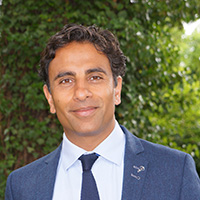
Kam Balaggan
Biography
Mr. Balaggan is a Consultant Ophthalmologist at Wolverhampton Hospital. He is unique in being one of exceptionally few surgeons that have completed not just two years of prestigious high-volume Fellowships in Vitreoretinal Surgery, but also two years of sub-specialist Fellowship training in Medical Retina, all at the internationally-renowned Moorfields Eye Hospital, London. This was in addition to his general training, which was also predominantly based at this Centre of Excellence and one of the world’s top Eye Hospitals. Mr Balaggan specialises in state of-the-art modern micro-incision sutureless vitrectomy surgery and micro-incision cataract surgery, in addition to treating medical retina conditions.
Mr Balaggan has an outstanding track record in research and teaching. He spent four years full-time researching at University College London developing cutting-edge novel retinal gene therapies for macular degeneration and inherited retinal disorders. He was awarded a PhD for this work, and has authored 30 peer-reviewed publications, including in the prestigious journals Nature Medicine, and New England Journal of Medicine. He has given numerous lectures nationally and internationally relating to his research, and also peer-reviews for six scientific journals.
He has been awarded numerous prizes recognising his contribution to advancing frontiers in ophthalmology. Mr Balaggan was also awarded the Best NHS Tutor Award (2012) by Bart’s and the London Medical School, and the Moorfields Educational Achievement Award(2013) in recognition of his enthusiasm for and skills in teaching trainee doctors and ophthalmologists.
He has presented many lectures and held discussion workshops for LOCs and has been pivotal on advising on enhanced services in Wolverhampton and New Cross such as the Minor Eye Conditions services (MECs). He has co-pioneered a highly successful lecture and patient practical based teaching program for local optometrists to substantially enhance their skills in detecting emergency vitreoretinal disorders.
Lecture title: Vitreomacular interface disorders
Vitreomacular disorders including epiretinal membranes, macular holes, and vitreomacular traction syndrome represent the commonest referrals to vitreoretinal departments in the UK and globally. The majority of these patients will present to primary care community optometrists. Many if not most patients with these conditions are referred to local or regional vitreoretinal surgery departments. The advent of OCT and the much wider and increasing availability of this technology in community practices has increased detection of these conditions but also introduces new challenges in community diagnosis, management and referral patterns for VMT disorders.
The content of the cases will cover essential ocular anatomy and OCT interpretation, and then focus on the salient clinical and OCT features of all common vitreomacular disorders with a very significant emphasis on optometry management of these conditions in the community, particularly, when and when not to refer, and the urgency of referrals. This is of vital importance as many VMT disorders are referred to hospital departments either unnecessarily, and/or with inappropriate urgency.
By fully educating community optometrists regarding their roles with respect to these disorders, not only will their confidence and competence be substantially increased, but so also should the quality of their referrals to vitreoretinal departments.
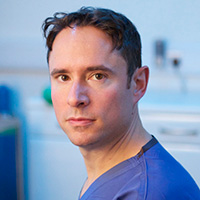
Allon Barsam
Biography
Allon Barsam is a Director at Ophthalmic Consultants of London. He is also the lead Consultant and fellowship director for corneal transplantation and complex anterior segment surgery at the L&D University Hospital NHS Foundation Trust, UCL Partners. His clinical and research interests are in complex anterior segment and corneal surgery, refractive surgery for high ametropia and safety in laser vision correction.
He was an elected council member for the Royal Society of Medicine Ophthalmology section and currently for the RCOphth examination committee for the national examination in laser and lens based refractive surgery (Cert LRS). He regularly chairs, presents and moderates at national and international meetings on complex anterior segment and refractive surgery.
He has run video based instructional courses at both the ASCRS & ESCRS for over 10 years. As well as over 40 scientific peer reviewed papers, he has co-authored two textbooks and 15 book chapters in topics related to cataract and refractive surgery. He is a member of the editorial advisory board and section editor for CRST Europe and a key opinion leader for the ophthalmic industry.
Lecture title: Cornea surgery update
This lecture will explore new treatments for keratoconus and therapeutic applications for laser and surgical options for the traumatised iris.
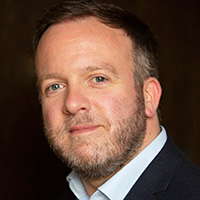
Jonathon Bench
Biography
Jonathon Bench is an optometrist, graduating from Cardiff University. He has worked as resident and mobile optometrist in both multiple and independent practices, and been a joint venture partner, before moving into contact lens category management. He also has experience of supporting eye care practitioners in both the UK and Canada to develop and enhance their contact lens business.
Jonathon now works as Head of Professional Affairs for Alcon®, where amongst other things he looks after their in-house (Alcon Academy) and in-field professional development teams and offering, delivering training, support and education to eye care practitioners throughout the UK and Ireland.
In 2015 Jonathon was elected to serve on BCLA council, and now sits on their Executive Committee, holding the position of President Elect from June 2018, before becoming President in June 2019. Through this and other commitments to the optometric profession he has also been part of working parties at the General Optical Council (GOC).
Lecture title: Peer discussion: using DEWS II to classify dry eye subtype and its severity
This discussion workshop will explore dry eye subtype classification and its severity. Following on from the work detailed in the DEWSII (Dry Eye Workshop 2 coordinated by TFOS (Tear Film and Ocular Surface Society)) report published in 2017 we will consider the three different subtypes of dry eye (aqueous deficient, evaporative and, the newly introduced, mixed dry eye). We will then proceed to understand the tests used to evaluate these dry eye types and the scales against which the severity of the presentation can be measured. The final discussion will then provide an opportunity for the group(s) to calibrate their interpretation of a presenting patient (achieved through images being provided) using the said scales (this is important to ensure consistency and continuity of care of a patient should they pass from one practitioner to another).
Dry eye is a disease that is increasing in prevalence when practitioners are asked about the frequency with which it is seen, but less clearly demonstrated in the prevalence data of surveys and papers. However, the risk factors for dry eye are certainly increasing in frequency. Dry eye is also a disease that has been identified by secondary care as one they wish to see more commonly managed in a primary care setting.
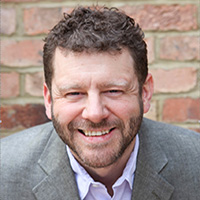
Guz Gazzard
Biography
Gus Gazzard completed undergraduate and medical school training at Corpus Christi College, Cambridge University. He was made a Consultant in the Glaucoma Service at Moorfields Eye Hospital in 2009 after a Clinical Fellowship at Moorfields 2006-08 and a Research Fellowship with Prof Peng Khaw in Singapore 1999-2002, where he ran and established several clinical trials investigating the surgical treatments of glaucoma (including the Singapore-5FU and the ACLIPS trials, both published in Ophthalmology). Since 2014 he has been UCL Reader in Ophthalmology (Glaucoma Studies) at the Institute of Ophthalmology, University College London.
Gus’ interests in the drop-free treatments of glaucoma continue with his current research into selective laser trabeculoplasty (SLT) and Minimally Invasive Glaucoma procedures (‘MIGS’). He introduced the “Trabectome” procedure to Moorfields and is training surgeons in the use of the Trabectome, iStent, Xen, InnFocus, CyPass and Hydrus shunts. Gus has established two large, six-year studies of laser treatment in the UK and China; is collaborating with Johns Hopkins (US) on defining outcomes for Minimally Invasive Glaucoma surgeries and co-ordinating a number of Cochrane Collaboration reviews of the devices.
In 2012 he established, as Chief Investigator, the six year NIHR-HTA funded (£1.7m) multi-centre LiGHT trial of selective laser trabeculoplasty which completed recruitment of 718 subjects in October 2014 – on target, on-time and due to report in 2018. He has since raised more than a further £500k to support this and other projects.
Lecture title: Selective laser trabeculoplasty - the LIGHT trial
Introduction to reasons for laser treatment for open-angle glaucoma.
Introduction to and results of the landmark LiGHT laser trial of selective laser trabeculoplasty for POAG / OHT.
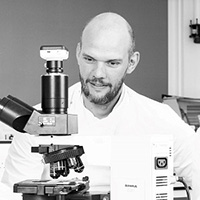
Liam Grover
Biography
Prof. Grover is a biomaterials scientist whose research focuses on designing materials that enhance the tissue regeneration process. He studied for both his undergraduate degree (biomedical materials science) and his PhD on the development of a novel bioresponsive ceramic (under the supervision of Jake Barralet) at the University of Birmingham, UK. On completion of his PhD, Prof. Grover spent two years working in the labs of Jake Barralet and Marc McKee at McGill University, Montreal, where he was awarded a CIHR Skeletal Health Scholarship to study the role of a range of proteins and condensed phosphates in the formation of minerals. He returned to the University of Birmingham in 2006 to establish a research group in the School of Chemical Engineering.
In the time since, Prof. Grover has held funding from a multitude of funding bodies, including: the EPSRC, BBSRC, MRC, NC3Rs, the Wellcome Trust, Orthopaedics Research UK, the MoD, the EU, the Drummond Foundation and the NIHR, as well as numerous industrial partners. Since 2006, he has been involved in raising more than £20m of research funding that has provided the University of Birmingham with an exceptional infrastructure for the development of medical technologies and directs the Healthcare Technology Institute located within the Institute for Translational Medicine.
He has published more than 150 peer reviewed publications, four book chapters, has been an inventor on eight patent applications and has taken three medical technologies to the point of clinical trial. He was made a Fellow of the Institute of Materials at 30 and was made one of the youngest full Professors in the history of the University of Birmingham at 32.
Lecture title: New biomaterials as delivery vehicles
The majority of eye drop materials are formed from simple entangled polymer dispersions or very weak gels, which are retained only for a short period of time on the surface of the eye. We have developed a way to “structure” gel-like materials in a way that they spread across the ocular surface and immediately thicken. These materials are retained in place for a period of up to three hours. We have shown that the use of these materials as carriers for biopharmaceuticals allows for far more efficient delivery and a significant enhancement in therapeutic outcome in models of corneal fibrosis.
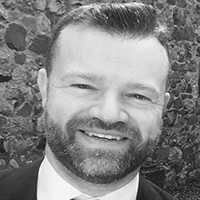
Declan Hovenden
Biography
Declan Hovenden is Head of Optometry at Technological University Dublin and is a board member (as education and training representative) of the Optical Registration Board of CORU, Ireland’s multi-profession health regulator. With a background in clinical practice in an ophthalmology setting specialising in cornel refractive surgery, he has a special interest in dry eye and anterior segment disease and regularly delivers clinical skills workshops to practitioners interested in developing that aspect of their professional practice.
Lecture title: Corneal foreign body removal
This workshop will teach delegates how to remove corneal foreign bodies using a range of different instruments and techniques; the delegate will perform and practise the techniques on model corneas at the slit lamp.
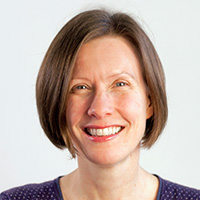
Hayley Johnson
Biography
Hayley was previously the resident optometrist in the Cardiff University Eye Clinic where hundreds of undergraduate students benefited from her expertise and encouragement.
She helped to develop the evidential support, training and assessment methods for the widely acclaimed Welsh Low Vision Service. This provides a community service that was traditionally undertaken within hospitals. It has proven to be effective, cost-efficient, and is preferred by users who appreciate the convenience and reduction in appointment delays.
Hayley developed her specialist clinical skills working alongside ophthalmologists at Bristol Eye Hospital. She is qualified as an Independent Prescriber, which allows her to prescribe medicines to treat eye disease.
Lecture title: Getting started with gonioscopy
This workshop will highlight the successful management of patients in whom gonioscopy would provide useful extra information. It will aim to examine how to deal with patients’ expectations as well as what to look for clinically before deciding on the best course of action. It will review the underlying mechanisms behind gonioscopy with a practical hands-on approach. It will also review the possible management strategies available to practitioners. Leaders will be on hand so that delegates are able to practice gonioscopy and gain confidence in the technique.
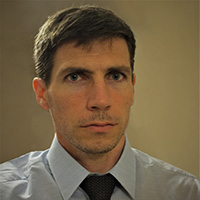
Michael Johnson
Biography
Dr Johnson is an independent prescribing optometrist who trained at Moorfields and Bristol Eye Hospital, and was awarded a PhD by the University of Wales. He has taught undergraduate and postgraduate students at university, acted as a consultant in the design and analysis of clinical trials for the pharmaceutical industry, and worked in Eye Casualty and out-patient medical clinics in hospitals. He now focuses on helping patients in private practice.
Lecture title: The therapeutics challenge
A range of cases will be presented that will include case discussion based on the full range of basic science, clinical assessment and clinical management of therapeutic optometry. The cases will centre on differential diagnosis, visual recognition, and appropriate therapeutic management. This is an interactive quiz-themed course that will include elements of case discussion and didactic teaching. Each case will be discussed on tables as part of a ‘round’ in the quiz and a table leader will be appointed to feedback the discussions to the whole room for the presenter to facilitate sharing the outcomes; the presenter then gives a mini-lecture after each round.
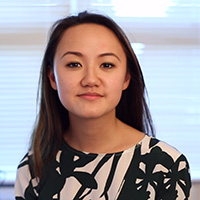
Xiaoxuan Liu
Biography
Dr Xiaoxuan Liu is a clinical researcher at the University of Birmingham and University Hospitals Birmingham NHS Foundation Trust. Her main research activity is around the development and validation of objective, machine-based techniques for detecting and quantifying inflammation in the eye. She also has an interest in the application of machine learning/deep learning to imaging for automated diagnosis of retinal disease, and for gaining novel insights into ophthalmic and systemic disease.
Lecture title: The power of quantitative imaging in uveitis and beyond
This lecture will cover novel innovations in imaging-based detection of ocular disease features, particularly for the quantification of inflammatory activity in uveitis.
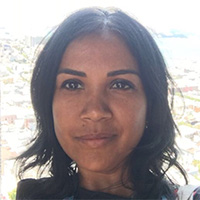
Tahmina Pearsall
Biography
Tahmina Pearsall is a consultant ophthalmic surgeon practising at Whipps Cross University Hospital – part of the prestigious Barts Health Trust. She is UK trained in centres of excellence such as Moorfields Eye Hospital, St Thomas’ and Addenbrooke's, which enables her to provide excellent medical and surgical care across all aspects of ophthalmology. Her research and surgical achievements have won many prizes both nationally and internationally and most recently she has been nominated for the Hospital Heroes Award.
Lecture title: Glaucoma masterclass: optic nerve examination
Glaucoma is an optic neuropathy leading to changes in the intrapapillary and parapapillary regions of the optic disc. Despite technological advances, clinical identification of optic nerve head characteristics remains the first step in diagnosis. Careful examination of the disc parameters including size, shape, neuro-retinal rim shape and pallor; size of the optic cup in relation to the area of the disc; configuration and depth of the optic cup; ratios of cup-to-disc diameter and cup-to disc area, presence and location of splinter-shaped haemorrhages; occurrence, size, configuration, and location of parapapillary chorioretinal atrophy; and visibility of the retinal nerve fibre layer (RNFL) is important to differentiate between the glaucomatous and non-glaucomatous optic neuropathy.
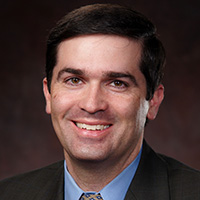
Chris Wroten
Biography
Chris Wroten, O.D., provides clinical care and is Chief Operations Officer at The Bond-Wroten Eye Clinics, a three-location optometric practice in Southeast Louisiana where he oversees all aspects of daily clinic operations. He’s founder of the clinic’s Primary Care and Ocular Disease Residency and Externship Programs, and holds adjunct faculty appointments at several schools and colleges of optometry.
Dr Wroten also holds appointment to the Louisiana State Board of Optometry Examiners, and moderates the American Optometric Association’s [AOA] Presidents’ Council.
He’s a board-certified Diplomate of the American Board of Optometry, and serves on Southern College of Optometry’s Board of Trustees, the AOA’s Federal Relations Committee, and as Vice Chair of the Southern Educational Congress of Optometry’s (SECO) Education Committee.
Dr Wroten has received numerous awards from state, regional, and national optometry organizations, and is a two-term Past President of the Optometry Association of Louisiana, continuing to Co-Chair its Education Committee and serve on its Legislative Committee. He has authored numerous articles and poster presentations, and has lectured across the United States and internationally on a variety of eye care topics. Dr Wroten received his Bachelor of Science in Chemical Engineering from Louisiana State University, and his Doctor of Optometry from Southern College of Optometry. He’s the honoured husband of his favorite optometrist, Sarah Wroten, O.D., and the proud father of Emily and Ben.
Lecture title: The future in focus: nanotechnology, stem cells and gene therapy in eye care
This fast-paced lecture reviews the background, history, and breakthroughs occurring in the areas of nanotechnology, stem cells, and gene therapy, with a focus on their potential impact on eye care. Topics include the possible risks and benefits of these cutting-edge technologies, how they work, and the results of recently published clinical trials and studies.
Lecture title: All about OCT
This lecture reviews the science behind optical coherence tomography (OCT), in addition to its indications for use, pearls for interpretation, and a clinical grand rounds of anterior and posterior segment OCT & OCT-A images from various ocular pathologies.
Lecture title: The future in focus: pipeline pharmaceuticals and new drug delivery technologies
This lecture discusses traditional pharmaceuticals, biopharmaceuticals/biologics, and orphan drugs that are in the pipeline, as well as recently released ophthalmic drugs. Additionally, new and emerging drug delivery technologies and the results of studies and research revealing novel uses for older/re-purposed medications will also be presented, as will novel drug delivery systems and technologies.
C-61458: New biomaterials as delivery vehicles (1 CET point)




Learning objectives:
- Be aware of research developments in the field of eye drop materials and understand the implications for the patient
- Understand the latest research relating to eye drop development and the implications this has for topical therapeutics
C-71153: Selective laser trabeculoplasty – the LiGHT trial (1 CET point)


Learning objectives:
- Understand the indications for laser treatment in patients with open-angle glaucoma
- Be able to understand the implications of the latest research relating to selective laser trabeculoplasty
C-71162: Getting started with gonioscopy (3 CET points)




Learning objectives:
- Understand when it is appropriate to undertake gonioscopy
- Assesses pupil reactions
- Uses diagnostic drugs to aid ocular examination
- Understand the appropriate techniques for disinfecting gonioscope lenses
- Understand how to undertake gonioscopic examination
- To enhance professional development by learning gonioscopic techniques to improve the management of the patient
C-71541: Cornea surgery update (1 CET point)




Learning objectives:
- Be able to explain to patients about new treatment options for keratoconus, therapeutic applications for lasers, and surgical options for the traumatised iris
- Be able to manage patients with abnormalities of the cornea and iris
- Be able to identify abnormalities of the cornea and manage the patient accordingly
- Be aware of when it is appropriate to refer patients with corneal and iris abnormalities to an ophthalmologist
C-71532: The ocular surface in glaucoma (1 CET point)




Learning objectives:
- Be able to elicit relevant symptoms from glaucoma patients presenting with ocular surface disease
- Understand the importance of managing ocular surface disease in patients with glaucoma
- Be able to explain to patients about the impact of glaucoma medication on ocular surface disease and the action needed to manage them appropriately
- Be aware of the adverse effects that can arise through the use of preservatives in topical medication
C-72011: All about OCT (1 CET point)


Learning objectives:
- Be able to use OCT to identify retinal abnormalities
- Be able to interpret OCT scans to assist with the management of a range of anterior and posterior segment pathologies
C-71542: Glaucoma masterclass - optic nerve examination (1 CET point)



Learning objectives:
- Be able to examine the optic nerve using appropriate techniques
- Be able to identify abnormalities of the optic nerve in patients with glaucoma
- Be able to undertake an appropriate assessment of key parameters of the optic nerve in glaucoma patients
C-71952: Corneal foreign body removal workshop (3 CET points)


Learning objectives:
- Be able to use a slit lamp to identify corneal foreign bodies amenable to removal in an optometric setting
- Be able to perform foreign body removal but recognise limits of skill so as to determine when onward referral is appropriate
C-71958: Vitreomacular interface disorders - Peer discussion (3 CET points)



Learning objectives:
- To develop a logical and systematic approach to hospital referral of patients with vitreomacular disorders
- To understand retinal anatomy and so to be able to interpret OCT images effectively
- To develop an understanding of current clinical hospital management of each of these vitreomacular disorders
- To be able to recognise and refer appropriately common vitreomacular disorders including:
- vitreomacular traction and vitreomacular adhesion
- Epiretinal membranes (including cellophane maculopathy and macular pucker)
- Lamellar holes and pseudoholes
- Full thickness macular holes
C-72040: Using DEWSII to classify dry eye subtype and its severity – Peer discussion (3 CET points)






Learning objectives:
- To understand the different techniques used to determine the dry eye subtype
- Through discussion with peers be able to review images/measurements and agree the severity of the presentation
- Using the DEWSII approach to dry eye disease identification and management the delegate will be able to adopt this approach into their own dry eye management routine
- Be able to assess patients presenting with dry eye disease and identify the subtype of the condition
- Be able to use the DEWSII report to improve prescribing decisions for patients with dry eye disease
C-72013: The future in focus: nanotechnology, stem cells, and gene therapy in eye care (1 CET point)


Learning objectives:
- Be aware of the latest research in the fields of stem cell and gene therapy for treating ocular disease
- Understand current and ongoing developments in the field of stem cell research and gene therapy for the treatment of ocular disease
Please check back soon for more information on this conference.
Workshops
Optional workshops will be taking place at the conference. More information will be available shortly.
Pricing
| Rate | |
| AOP Members | £315 |
| Non-members (see also the SECO/AFOAS pricing on the next tab) |
£375 |
Please note that all bookings for AOP events are subject to our terms and conditions, which include our cancellation policy.
Accommodation
If you are interested in booking accommodation directly at the Holiday Inn, Bloomsbury, please call the reservations team at the hotel directly on 020 7923 6601 and quote reference AOO.
Please note that contact information and debit/credit card details will be taken in order to secure the booking.
The rates for accommodation, bed and breakfast, are:
- Saturday 21 September: £189
- Sunday 22 September: £129
More information on the conference will be available shortly. If you have an enquiry regarding this conference please contact [email protected]
| Conference only | £315 |
| Conference plus three nights' accommodation (Saturday, Sunday and Monday nights included) |
£745 |
To book your place, please complete and return the booking form.
Please note that all bookings for AOP events are subject to our terms and conditions, which include our cancellation policy.
Accommodation
If you are interested in booking accommodation directly at the Holiday Inn, Bloomsbury, please call the reservations team at the hotel directly on 020 7923 6601 and quote reference OOP
Please note that contact information and debit/credit card details will be taken in order to secure the booking.
The rates for accommodation, bed and breakfast, are:
- Saturday 21 September: £189
- Sunday 22 September: £129
- Monday 23 September: £168
More information on the conference will be available shortly. If you have an enquiry regarding this conference please contact [email protected]
10+ COPE hours applied for
| Session | Code |
| The future in focus: stem cells and gene therapy in eye care | 63222-GO |
| All about OCT | 63235-PD |
| Vitreoretinal-themed peer discussion | 63269-PS |
| Corneal surgery update | 63399-AS |
| Selective laser trabeculoplasty | 63237-GL |
| New biomaterials as delivery vehicles | 63247-GO |
| The future in focus: pipeline pharmaceuticals and new drug delivery technologies | 63225-PH |
| Corneal foreign body removal workshop | 63246-AS |
Sessions awaiting approval:
- Uveitis lecture
- The ocular surface in glaucoma
- Glaucoma masterclass: optic nerve examination
- The therapeutics challenge
- Gonioscopy

ALCON
For more than 70 years, Alcon® has been re-imagining eye care together with its customers and their patients. Through innovative products, customer partnerships and education for eye care professionals, Alcon has continued to demonstrate its commitment to eye care excellence and helping people see brilliantly.

Mainline Instruments
Mainline Instruments has grown as an independent supplier of ophthalmic instrumentation that offers novel solutions for the optometry world.
Formed in 1997 and based in Birmingham, Mainline are ideally experienced and located to provide support for the many products available. Mainline supply a variety of products from established manufacturers such as Icare, Keeler, Tomey, Huvitz, Neitz, Oculus and more.

VISUfarma
VISUfarma is pan-European ophthalmic speciality pharmaceutical company with a clear mission: to bring global innovation to European eye health. We are an ambitious and fast growing ophthalmology player, commercialising a wide portfolio of products and devices across Europe. Our promise is to offer high quality products and to spread eye health innovation and knowledge, from across the globe, throughout Europe.
www.VISUfarma.com
